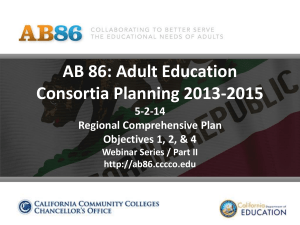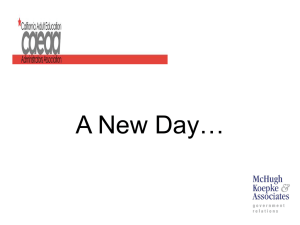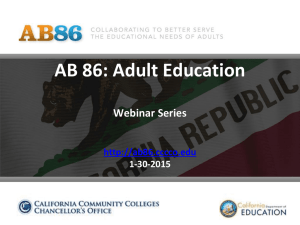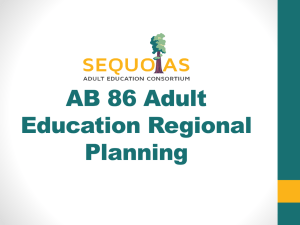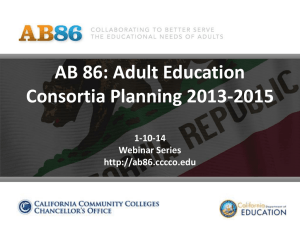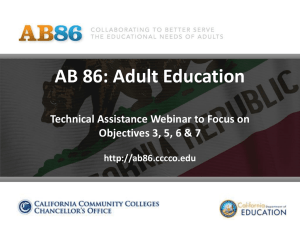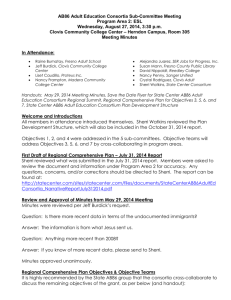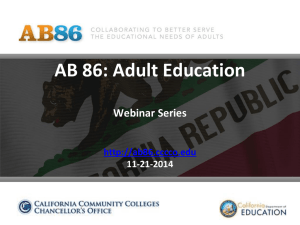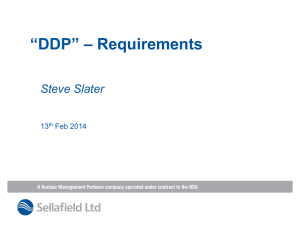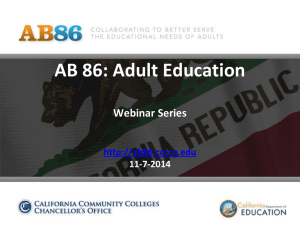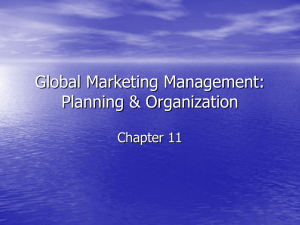Dr. Debra Jones - California Workforce Association
advertisement
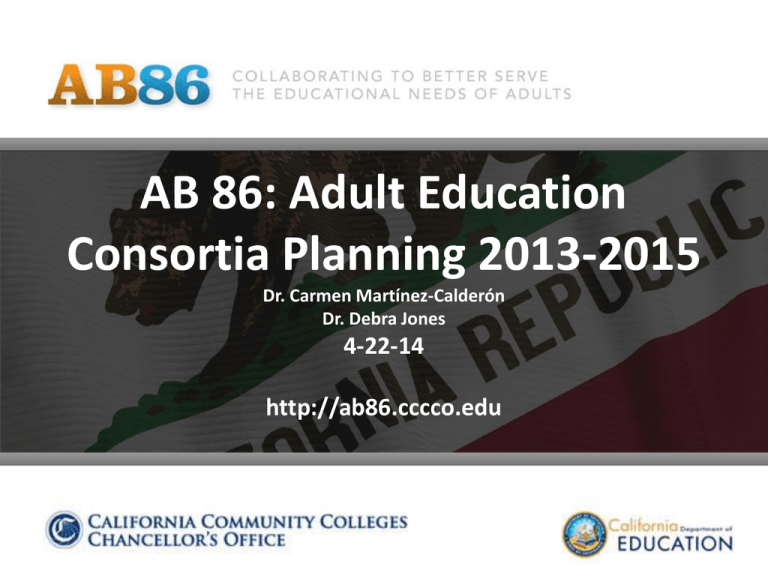
AB 86: Adult Education Consortia Planning 2013-2015 Dr. Carmen Martínez-Calderón Dr. Debra Jones 4-22-14 http://ab86.cccco.edu Strengthening California’s Workforce • State Outlook - Statistics • Connection between Workforce and Adult Education • Commitment from Legislature • What we’ve done • Why you need to be involved • How you can be involved 4-22-14 State Outlook Monthly Labor Force Data for Counties – January 2014-Preliminary – Data Not Seasonally Adjusted Employment Development Department, Labor Market Information Division, Report 400C, March 7, 2014 http://www.calmis.ca.gov/file/lfmonth/countyur-400c.pdf 4-22-14 MT OJT = Moderate Term on the Job Training, LT OJT = Long Term on the Job Training 4-22-14 MT OJT = Moderate Term on the Job Training, LT OJT = Long Term on the Job Training 4-22-14 MT OJT = Moderate Term on the Job Training, LT OJT = Long Term on the Job Training 4-22-14 http://www2.ed.gov/about/offices/list/ovae/pi/AdultEd/state-profiles/california.pdf 4-22-14 http://www2.ed.gov/about/offices/list/ovae/pi/AdultEd/state-profiles/california.pdf 4-22-14 $25 Million Statewide for 2 Year Planning AB 86, Section 76, Article 3 • Consortium shall consist of: – School district – required – Community college district – required • Consortia may include other adult education providers • Consortium determines fiscal agent 4-22-14 Regional Consortia Grant Funds • The consortia will use funding to develop regional plans for adult education in: 1. Elementary and basic skills; classes required for HSD or equivalency certificate; 2. Classes for immigrants: ESL, citizenship, and workforce preparation; 3. Programs for adults with disabilities; 4. Short term CTE programs with high employment potential; and 5. Programs for apprentices. 4-22-14 Organizational Structure • Cabinet – The California Community College Chancellor’s Office (CCCCO) and the California Department of Education (CDE) have jointly established an AB 86 Cabinet of six members, three from each agency. • Work Group – Established by the AB 86 Cabinet – Twelve members, • Four representing adult education programs in school districts • Four representing adult education programs in community colleges. • Four staff members, two from the CCCCO and two from the CDE, are also in the Work group. • Guiding Principles – Inclusion, Transparency, Equality, Representation of Adult Learners 4-22-14 What is a “Region”? • The AB86 Work Group has recognized the need to define “Region” • For the purpose of planning we are using the bill language which defines region as the geographic boundaries of community college districts. • 72 Community College District Boundaries • Boundaries are used for the purpose of defining a consortia geographical area and NOT to define leadership roles within consortiums. • Shared Leadership • Map on Website • Partners and Members 4-22-14 Website - http://ab86.cccco.edu 4-22-14 AB86 Planning • • • • • • • • • • • • Website - http://ab86.cccco.edu Survey of Interest Town Hall Meetings Stakeholder Sounding Board (Unions, CWIB, Apprenticeship) Expert Panel State Reports FAQs on website CoE released in December Webinar Series Demographic Data Posted E-Newsletter Analysis 4-22-14 14 Sample Demographic Data 4-22-14 Partners Workforce Investment Boards • 56 of 70 consortia included WIBs (80%) • 41 of the 49 WIBs are included in the consortia plans (83%). County Office of Education • 33 of 70 consortia included (47%). • 38 of the 58 COEs are included in the consortia plans (65%) Regional Occupation Centers & Programs • 20 of 70 consortia included ROCPs (28%). • 28 of the 72 ROPs are included in the consortia plans (38%). 4-22-14 Partners • Community Based Organizations: 44 of 70 (62%) • County Social Services: 41 of 70 (58%) • Public Libraries: 36 of 70 (51%) • Unions/Employers: 36 of the 70 (51%) • Jails: 28 of 70 (40%) • State Partners: 26 of 70 (37%) 4-22-14 What We Hear from the Field • Regional Structures in place • Resource - More information needed • From silo to information exchange • Labor force needs within regions • Training providers – collaboration efforts to leverage resources • Pipeline from education to workforce 4-22-14 Moving Forward • Local Plans • Building Bridges • Report to Leg – March 2014 – March 2015 • Regional Comprehensive Plans • Conclusions • Recommendations 4-22-14 Questions for Discussion • Are you currently involved, actively planning? • How will you strengthen your participation within consortia? • What are the challenges of collaboration with educational institutions? • What resources would be helpful to facilitate involvement? • What can we do? 4-22-14 Questions, Ideas, and Comments Dr. Carmen Martínez-Calderón California Department of Education (916) 319-0479 Cmartinez-Calderon@cde.ca.gov Dr. Debra Jones California Community College Chancellor’s Office (916) 322-6972 djones@cccco.edu • ab86@cccco.edu • http://ab86.cccco.edu 4-22-14
